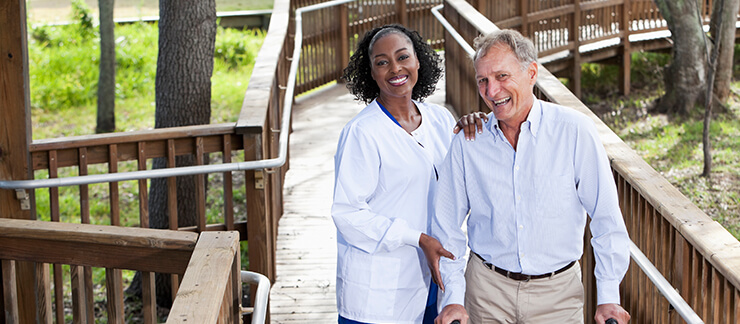
Uprooting an Aging Loved One: What to Know
Packing up a lifetime of memories — and stuff —makes the prospect of moving an elderly loved one quite overwhelming. Add in a dementia diagnosis or terminal illness, a history of a strained relationship, or the recent loss of a spouse, and you have an even more complicated decision ahead of you. Still, there are times when a move is necessary so you can better provide the care, support and presence an older loved one needs.
As you weigh the pros and cons of a move — whether across the street or the country — keep these factors in mind:
Moving is More Than a Change of Address
Many caregivers underestimate the emotional impact of moving. Of course, there’s the stress of packing, coordinating logistics, selling a home and more, but there’s also the emotions stirred up by the thought of leaving one’s comfort zone, one’s routine, one’s place for many years of life. Even if a parent or older loved one hasn’t been able to maintain the home or be involved in the community for a while doesn’t mean it will be easy to leave neighbors, friends and all that’s familiar behind. They’re leaving favorite restaurants, stores, a barber, beautician, or mail carrier they’ve known for years. Those traveling long distances may be leaving health providers who understand their detailed medical history and care needs. They'll miss the beautiful view of a nearby lake from their bedroom window, or the next door neighbor’s little ones playing in the yard.
While you’re thinking of how much easier it will be to care for Mom when she’s downstairs or down the street, remember how much Mom is leaving behind by moving. Starting any conversation about a potential move is likely to be better received from this place of compassion and understanding.
Moving is a Team Effort
Again, besides the physical efforts involved in packing and unpacking, downsizing and streamlining, it's essential to include your older adult or loved one in the process. Ask for their input on where they'd like to live, and what they enjoyed most about the place they're leaving.
Consider things like proximity and the impact on your relationship: would it be better for Dad to maintain his independence in a small apartment close to you instead of moving him into the basement apartment of your home? If you’ve had a strained relationship in the past and you’re planning to move your parent into your home, make sure you both have a private space in the home for when you need distance.
If your children or grandchildren are still living in/regularly visiting your home, you can all enjoy the benefits of intergenerational interactions. But you’ll also need to prepare for the adjustment of someone new living in the space, and the new dynamic.
Moving is Not a One-Time Event
Moving is a process. You pack, transport, unpack, settle.
Those are the physical steps of the process, but unpacking and settling take time. Adjusting to a new routine and a new place takes time. If your mother-in-law lived in a different time zone before and you only communicated by phone weekly or monthly, having her living in your time zone will be a radical change. Making new friends won't happen overnight, and you may have to facilitate these social connections. You'll have to find new health care providers. This can also take time, especially if you're committed to finding the right fit. Through all these changes, be patient with yourself and your loved one. There may be times you need to push your loved one to make social connections or find a hobby, and other times, when you need to step back.
Social media can be an excellent way for your senior loved one to make new friends or to meet new people in a new community. Click here for the benefits of getting your senior loved one onto social media.
Moving Changes a Person
A move is inherently stressful and can bring out the worst in a person. But it can also provide an opportunity to connect with a parent or older relative in new ways, and in this new phase of your lives. That said, the move will change life for both of you. It’s not just something happening to the older adult you’re “uprooting,” it will change the dynamic and daily routine of your own life and household. Be prepared for possible power struggles or conflict, but also be open to unexpected joy in this new stage of your relationship.
Start Building Your Village Immediately
You may think that by moving your loved one closer, you'll be able to handle care on your own. And while that may be true at the beginning, you'll want to establish a support network — build your caregiving village — early on. In fact, getting as much of that support system in place before the move is ideal because it's one less thing to consider as you're dealing with the stress of unpacking and settling.
As you anticipate a move, start researching and engaging with local home care providers. Get to know what services they offer and how they could meet your loved one’s unique situation and needs. Consider starting services for even just a few hours a week soon after your parent or older relative arrives to establish a rapport with the agency and develop a relationship with a professional caregiver. You may find after a loved one arrives that she requires more or less care than you anticipated, and you can adjust accordingly. But starting this process sooner will ease that transition to home care when the time comes.
Click here for more information on companion care, and how this could be just what your senior loved one needs in his or her new setting.


